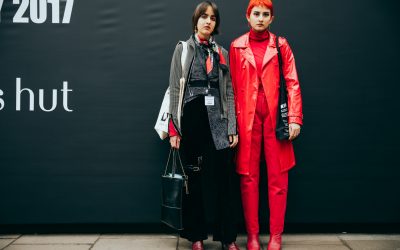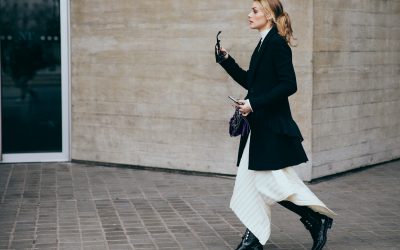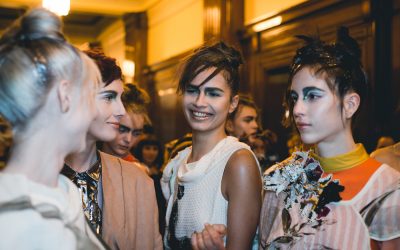Meet the ex-firefighter, gender non-binary model and activist who’s taking over the fashion industry
Words Tom Rasmussen
Photographer Charl Marais
Stylist Annie Swain
Hair & Make-up Roberto Muroni
Model Rain Dove at Profile
From Vanity Fair featuring Caitlyn Jenner’s public debut on their cover, to the industry employing one of the relative highest numbers of trans men and women in any creative industry globally, to countless think pieces, editorials and collections promoting and celebrating gender diversity, fashion, on the whole, has really been a major support for the advancement of public perception of gender nonconformity. But recently the conversation has slowed down. As with anything, fashion is quick to adopt, but even quicker to forget.
Rain Dove is a model who rose to fame because of their eloquence – both visually and verbally – in challenging the status quo about the way non-binary people are treated in the fashion industry. An ex firefighter, UC Berkeley grad, Brooklyn-dwelling gender non-conformist, Rain has spent equal amounts of time being both a model and a gender activist.
I’m not meant to be this fairy dust, delicate, prancing-around person: I can do it, but it’s never going to look like a butterfly floating around in the breeze; it’s going to look more like a butterfly fighting with the breeze
On arriving to the studio, I find Rain’s energy contagious. Oozing confidence and positivity throughout the shoot, Rain moves fluidly from look to look. The garments become de-gendered and I can’t tell whether I am looking at women’s or menswear, which is exactly the point. “Who cares, it’s all totally constructed,” Rain says.
The shoot stops for lunch, and Rain steps forward and shakes my hand, kisses me on the cheek and we go out to get pizza. Over lunch we talk male privilege, gender capitalism and being treated differently as a “man” and as a “woman”.
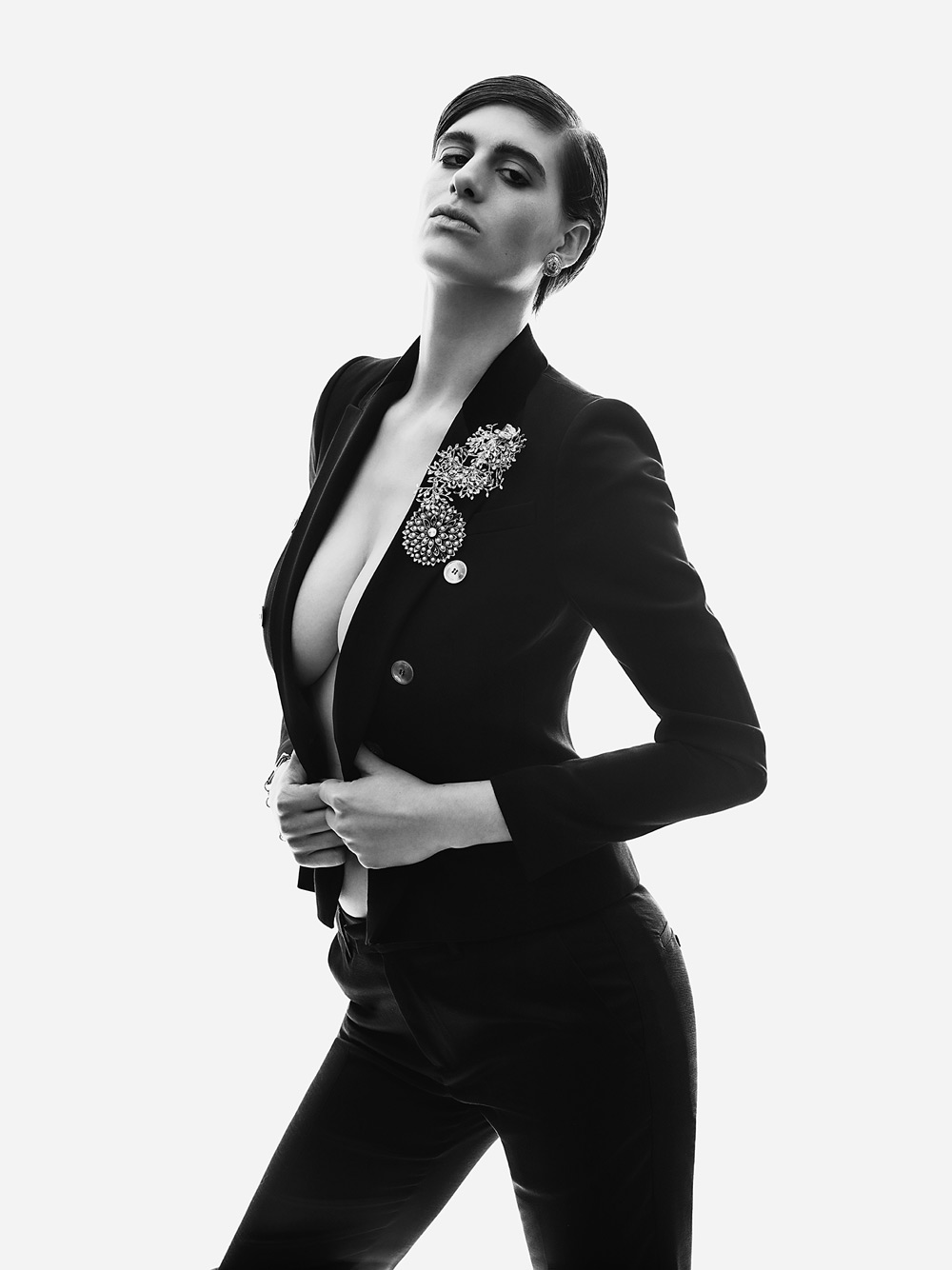
Trousers, UNITED COLOURS OF BENETTON, £49.50
White shirt, REISS, £90
Tie, MOSS BROS, £20
Jacket, KAREN MILLEN, £210
Brooches, Stylist’s own
Earrings, vintage Versace, Stylist’s own
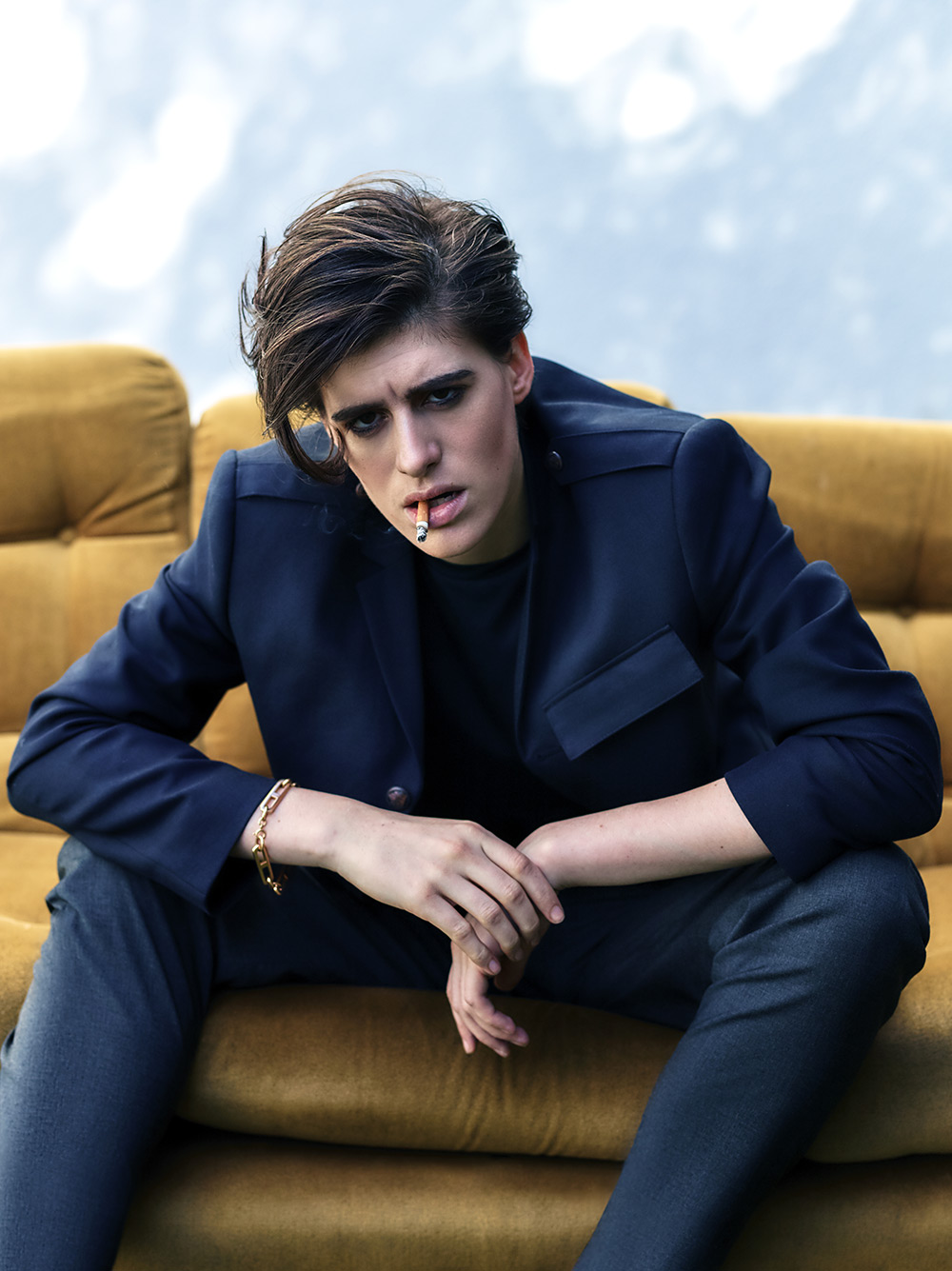
Trousers, UNITED COLOURS OF BENETTON, £49.50
White shirt, REISS, £90
Tie, MOSS BROS, £20
Jacket, KAREN MILLEN, £210
Brooches, Stylist’s own
Earrings, vintage Versace, Stylist’s own
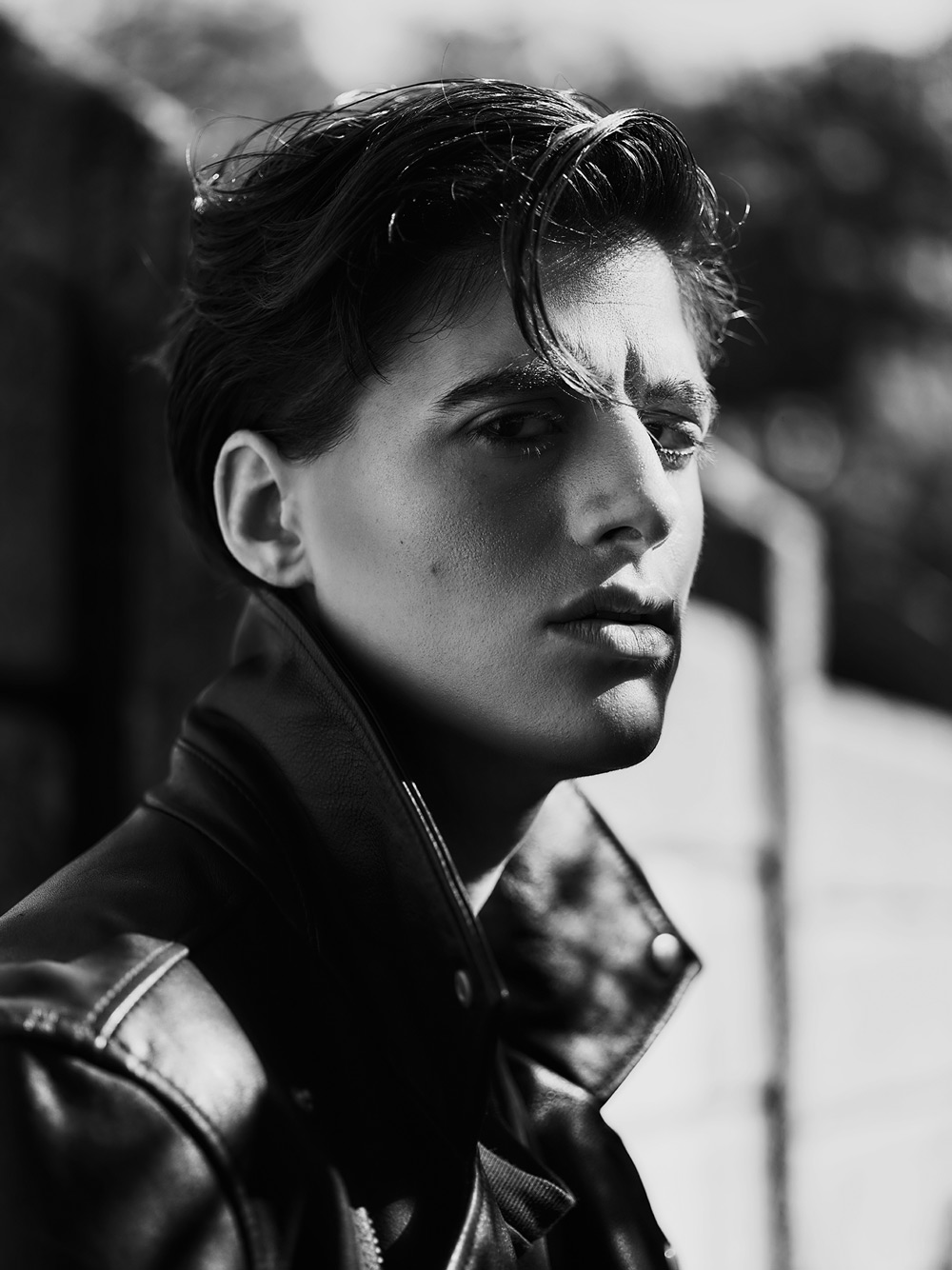
Grey hat, CHRISTY’S HATS, £119
Navy sleeveless top, TOPSHOP, £20
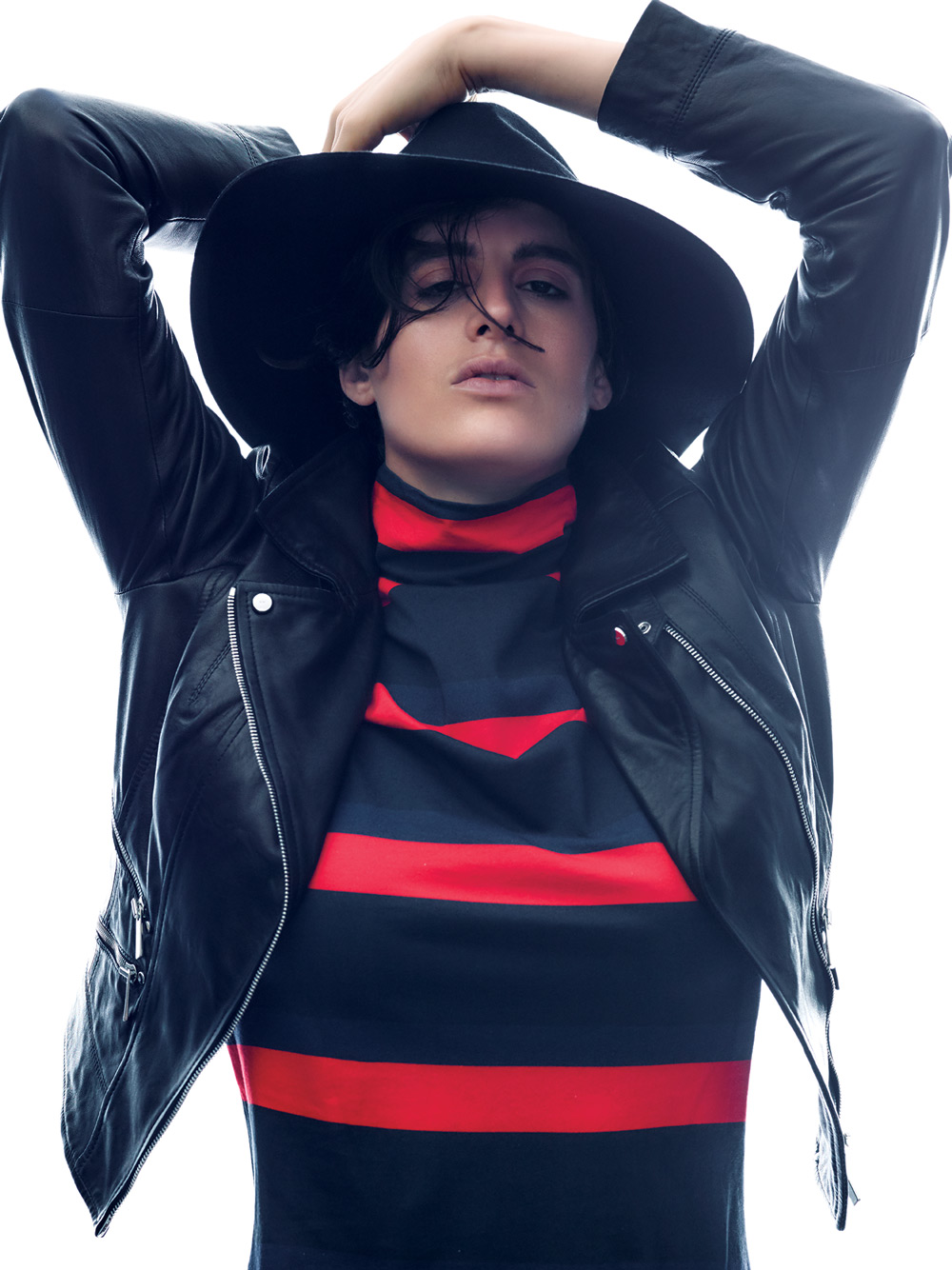
Red stripe top, BACK, £125
Fitted leather jacket, KAREN MILLEN, £350
Fedora hat, TOPSHOP, £22
..people have a very specific idea of what a woman should look like: how they should pose, how they should hold each other, how much muscle tone they should have, how much makeup they should wear
As a gender non-conforming model, have you faced prejudice in fashion shoots?
Absolutely. It depends on what I get booked for. When I get booked for what society deems to be “menswear”, it’s very easy and I can do whatever I want. But whenever I do something that society deems to be “womenswear”, people have a very specific idea of what a woman should look like: how they should pose, how they should hold each other, how much muscle tone they should have, how much make-up they should wear. When I do “menswear” a lot of people are like “since you don’t technically classify via genitals as a man, anything you do is fine”. But as a woman it’s like “you’re not being feminine enough, you’re not being delicate enough”.
The thing is I’m not meant to be this fairy dust, delicate, prancing-around person: I can do it, but it’s never going to look like a butterfly floating around in the breeze; it’s going to look more like a butterfly fighting with the breeze. I think people compare my performance to a lot of “female” performances they’ve seen and use that to determine if I’m doing a good job or not. A lot of the womenswear shoots I have done have felt extremely contrived because of this, especially if I’m modelling with other women.
When you’re modelling menswear and womenswear do you feel you’re treated differently?
Absolutely. Well, I have this thing that’s called gender capitalism. It’s a term I coined, and it really helped build up my career to be honest. I feel like the language I was taught at birth can’t accurately explain to people the truth of what I want, and how I want it. So we have different expectations through culture, through art, through – ironically – fashion.
As a woman, people are very delicate with me. I don’t have time to wait in line, I don’t have time to be pressed, so for me, if you’re going to treat a guy better, then I’ll do anything to get the respect I deserve as a person, even if that means acting and looking like a man. If you treat what you categorise as a woman better, then I’ll whip these tits out so fast. I joke. But I want to jump the line, I want to achieve my basic needs: physical safety, water, shelter and why should I not use what I have to get it? We base people off of a tool [their bodies] they didn’t get to choose, so why should I be defined by mine?
It’s very rare that you see a “female” model doing something in power, that’s without makeup on or huge stilettos
Can you explain why you think it’s the womenswear shoots that are the most difficult? Do you think that’s a wider societal issue about the expectations we have of women?
I think that women have a lot of power in the fashion industry as far as earning power: women earn twice as much as men, it’s one of the only industries in the world like this – other than prostitution – and women have a lot of control as a result. But there’s still a great amount of control over that control. There’s a heavy sexpectation because in this industry sex sells. It’s very rare that you’ll see a “female” model with muscles, it’s very rare that you see a “female” model doing something in power, not wearing makeup or huge stilettos. Most times women are shown in a place of power sexually, but it’s very rare that they have a photo of a female rock climbing in Givenchy in no makeup and the only thing she’s got on her is the sweat from her hard work. I think people are, obviously, so concerned with selling things. I mean, most fashion designers are in a very saturated market, and they aren’t concerned with making sociopolitical change, they are concerned about making money. You can’t blame them for doing what they know will sell to their consumers.
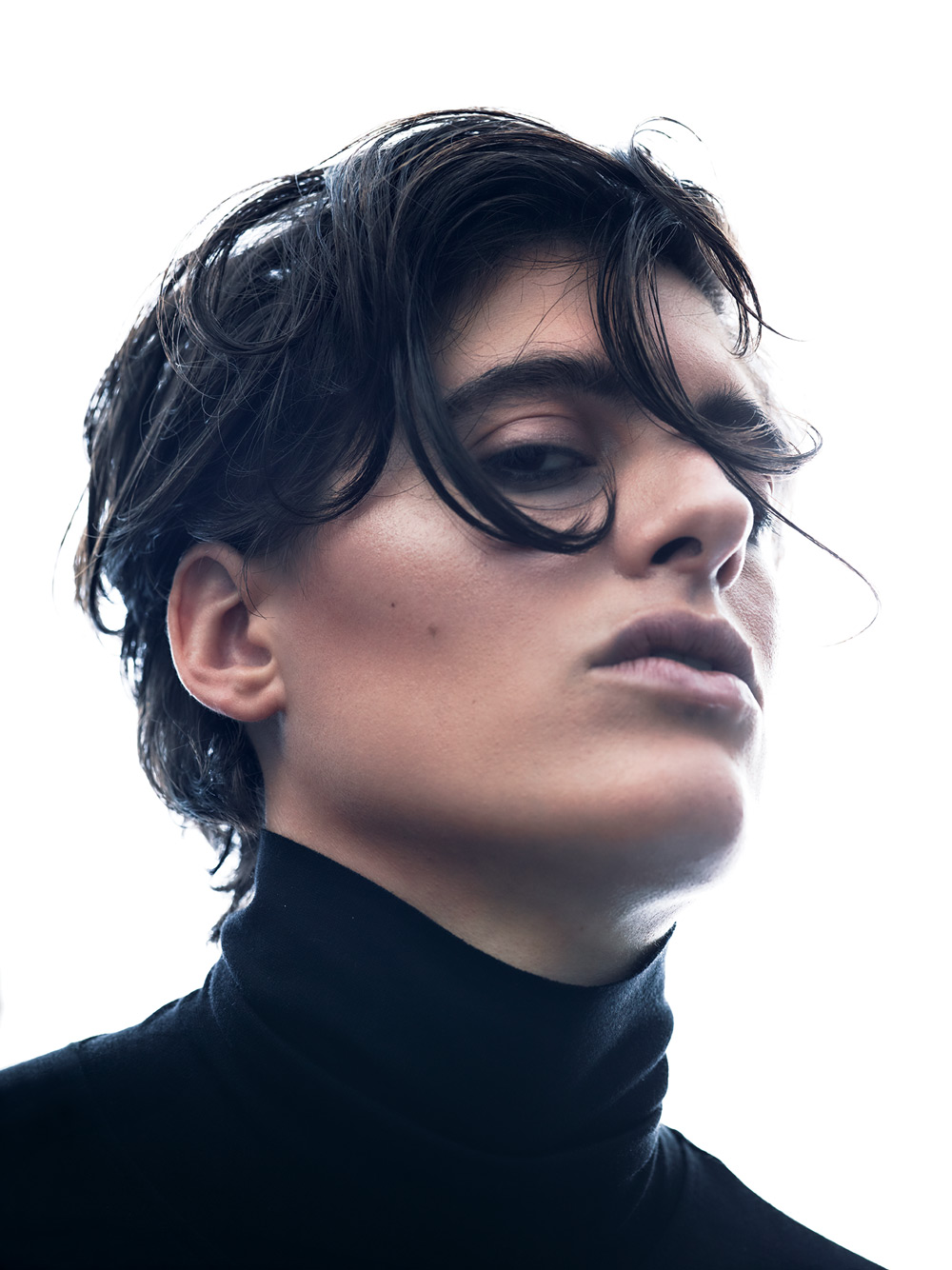
Black roll neck top, BLACK, £145
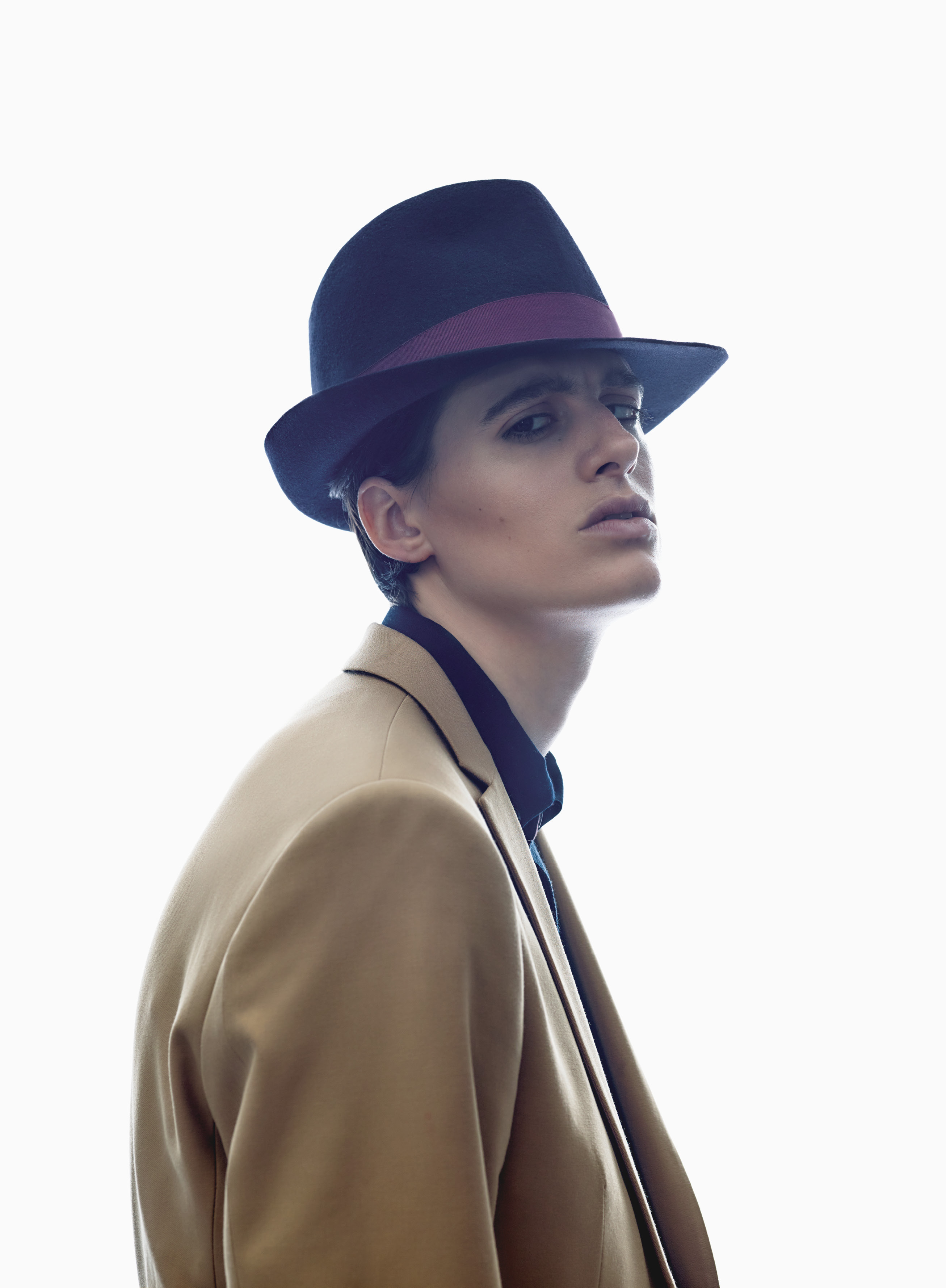
Tan blazer, ASOS, £60
Long sleeve polo top, TED BAKER, £89
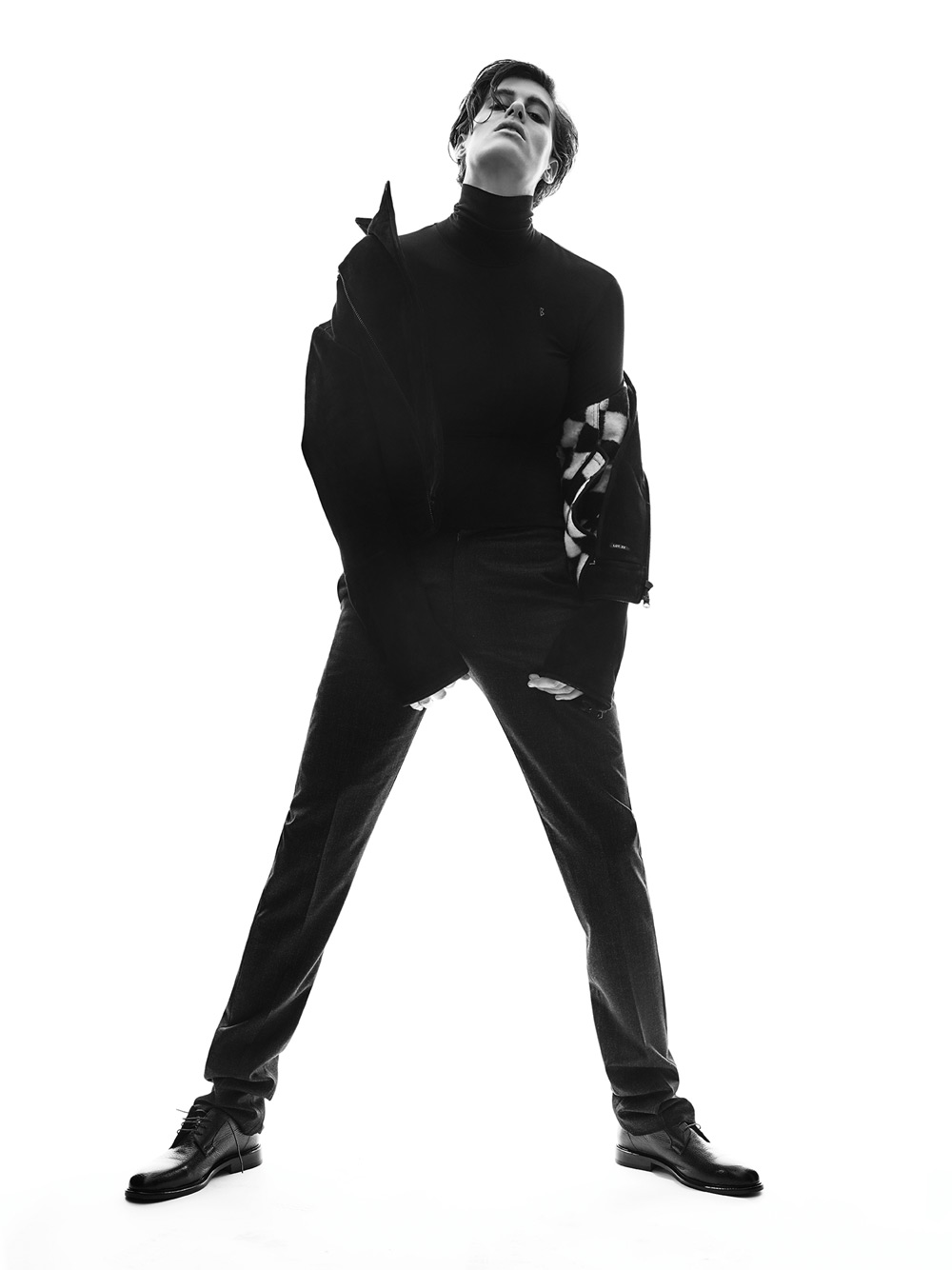
Black roll neck top, BLACK, £145
Black suede jacket with checked lining, SCOTCH AND SODA, £469.95
Grey trousers, REISS, £115
Brogues, REISS, £185
Can you not blame them? Can you not ask them to be more socially responsible? Because these are the people dictating the trends and the pieces that their customers will buy, so surely if they say something sociopolitically interesting, it will sell?
Okay, it’s not that you can’t blame the designers at all, or the photographers or the people who shoot editorials, which designers rarely have control over. Like these G-Star pants I’m wearing: who knows if the brand are going to be happy to see me in their jeans. But we as a society are responsible for the things we want to change: we are the consumer, the customer. It’s not like a designer produces the clothing and they’re the only designer to pick from. We as the consumer have thousands of choices, so if we really don’t want something to be portrayed in a certain way we as a consumer can choose not to shop somewhere. Fashion is in a whirlwind right now.
…society, via social media, has created a more open space in terms of gender, which is leading fashion, and there’s a way to make money. There are very few people who are like ‘fuck it, I’ll make my art’
What do you think about the ongoing conversation around gender in fashion? Conversations about matters of transgender, gender non-binary people, gender queer people have blown up in the past few seasons, but do you think that recently it’s gone away? Do you think that social changes are often treated as trend in fashion?
Well there’s a lot of great questions there, so I’ll answer in parts. I think that things shifted when people realised they could make money off of this. Before we weren’t able to collect data with regards to the number of people purchasing and wearing clothing that doesn’t match their birth certificate, but because of social media we can see what people are buying now.
For the designer it’s not about making sociopolitical change, it’s about paying the rent so they will be attracted to anything that will help them do that. So society, via social media, has created a more open space in terms of gender, which is leading fashion, and there’s a way to make money. There are very few people who are like ‘fuck it, I’ll make my art’.
Then with gender there are always going to be people who see it as a trend. But what I, for example, bring to the table is the fact that my lifestyle is not a trend, my gender identity is not a trend. The best thing I can do is be consistent.
Do you feel pressure though? When modelling is so about the look, about being a walking clothing rack?
Totally. But I’m not. I’m not a model. I’m an activist, I’m a movement, we’re all a movement and we have to find that within ourselves. When I say I’m a movement I’m not narcissistically saying that I am the movement, we are all a movement. But it’s hard for people, it’s hard for people to develop their own brands. Because we have been taught since birth to put ourselves down, to expect less.
I’m not a model. I’m an activist, I’m a movement, we’re all a movement and we have to find that within ourselves
Especially queer people, non-binary people, trans gendered people, women, people of colour: we have all been taught by society to put ourselves down, right?
Yeah. For sure. It’s a tricky time, but I think we’re going to get there. Social media is an interesting example – it has been so devastating in so many ways – but also now we have conversations overnight that would have taken years and years to happen. It is happening. We are often told by the older generation that our voices don’t matter, that we’re apathetic. But I think that especially people who are online right now are part of a really important movement, something that will take down countries and break down borders.

Black roll neck top, BLACK, £145
Black suede jacket with checked lining, SCOTCH AND SODA, £469.95
Grey trousers, REISS, £115
Brogues, REISS, £185
Hair & Make-Up Roberto Munroni
Stylist’s Assistant Leigh Williams
Meet the Most Stylish Show-Goers from Day 4 of London Fashion Week AW17
From bloggers to Editors-in-Chief, we round up the best of the street style contingent
Meet the Most Stylish Show-Goers from Day 3 of London Fashion Week AW17
From bloggers to Editors-in-Chief, we round up the best of the street style contingent
Backstage With New Delhi Womenswear Label N&S GAIA, London Fashion Week AW17
The eco-friendly brand presented a painterly, nature-inspired collection for their second catwalk appearance


